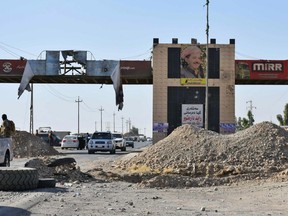'We don't trust Americans any more': Roadblock on Kurdish quest for independence in Iraq
Last Monday, Iraqi government forces and an Iranian-backed militia ousted the Peshmerga from the disputed city of Kirkuk

Article content
IRBIL, Iraq — Solemn protesters holding aloft Kurdish flags surrounded the U.S. embassy and UN consulate here over the weekend, while a man scaled the walls of the Iranian embassy to tear down its flag.
United in their anger, they chanted “Yes, yes, Kurdistan” and carried signs saying: “We want our country.”
The shock and indignation in Irbil, the capital of the Kurdish region of Iraq, was part of a new chapter in the Kurds’ bitter quest for independence.
The Kurdish community never expected such a reaction from the Iraqi government
A month ago, Iraqi Kurdistan’s leaders seemed sure their path to nationhood was all but guaranteed. The autonomous region controlled swaths of disputed territory in northern Iraq, including vast oil reserves and energy infrastructure. Its armed forces, the Peshmerga, enjoyed a formidable reputation and had worked closely with the U.S., Canada and other allies in the fight against ISIL. The way, they thought, was clear.
But last Monday, Iraqi government forces and an Iranian-backed militia ousted the Peshmerga from the disputed city of Kirkuk, along with nearby oilfields that the Kurdistan Regional Government (KRG) had counted on to sustain an independent state. The defeat came shockingly fast and prompted a disorderly retreat from other territories that Masoud Barzani, the KRG president, had pledged would never be returned to Baghdad.
The rout blindsided many Kurds and left their long-held dream of secession in tatters.
In Irbil, soldiers and civilians alike are still struggling to come to terms with this profound humiliation.
“The Kurdish community never expected such a reaction from the Iraqi government,” said Alan, 26, who asked that he be known only by his first name.

The crisis was largely impelled by last month’s controversial independence referendum, which faced near-universal opposition. Neighbouring Turkey and Iran found a rare moment of unity to agree on retaliatory counter-measures, most international allies opposed the vote, and Haider al-Abadi, the Iraqi prime minister, threatened military action if the results were not annulled.
But Barzani pressed on, confident the results would trigger secession talks in which the Kurds would hold a major advantage.
That now appears to have been a huge miscalculation.
Voting went ahead as planned on Sept. 25 and results reflected an overwhelming desire for independence. Baghdad quickly retaliated, banning international flights from landing in the region and demanding control of oil exports.
Eventually, Abadi made good on his military threats. Soon after retaking Kirkuk, he called for a return to talks while discarding the referendum result. This now seems to be the only option for Barzani.
Iraq’s Kurds now see betrayal from every side, including international allies. The U.S. has been slow to react to both the referendum and crisis in Kirkuk, and when government troops pushed the Peshmerga out of the fringes of Kirkuk province on Friday, a statement from the Kurdish General Command highlighted that they faced “American weapons that have been supplied to the Iraqi army.”
For Baran Abdullah, 25, a Peshmerga fighter, the U.S. was no longer a friend.
“We don’t trust Americans any more and we don’t need them any more,” he said angrily. “We are finished with them.”
Our website is the place for the latest breaking news, exclusive scoops, longreads and provocative commentary. Please bookmark nationalpost.com and sign up for our daily newsletter, Posted, here.









Postmedia is committed to maintaining a lively but civil forum for discussion. Please keep comments relevant and respectful. Comments may take up to an hour to appear on the site. You will receive an email if there is a reply to your comment, an update to a thread you follow or if a user you follow comments. Visit our Community Guidelines for more information.